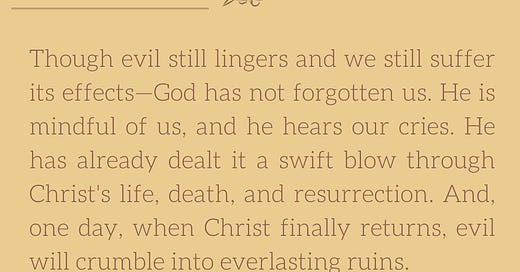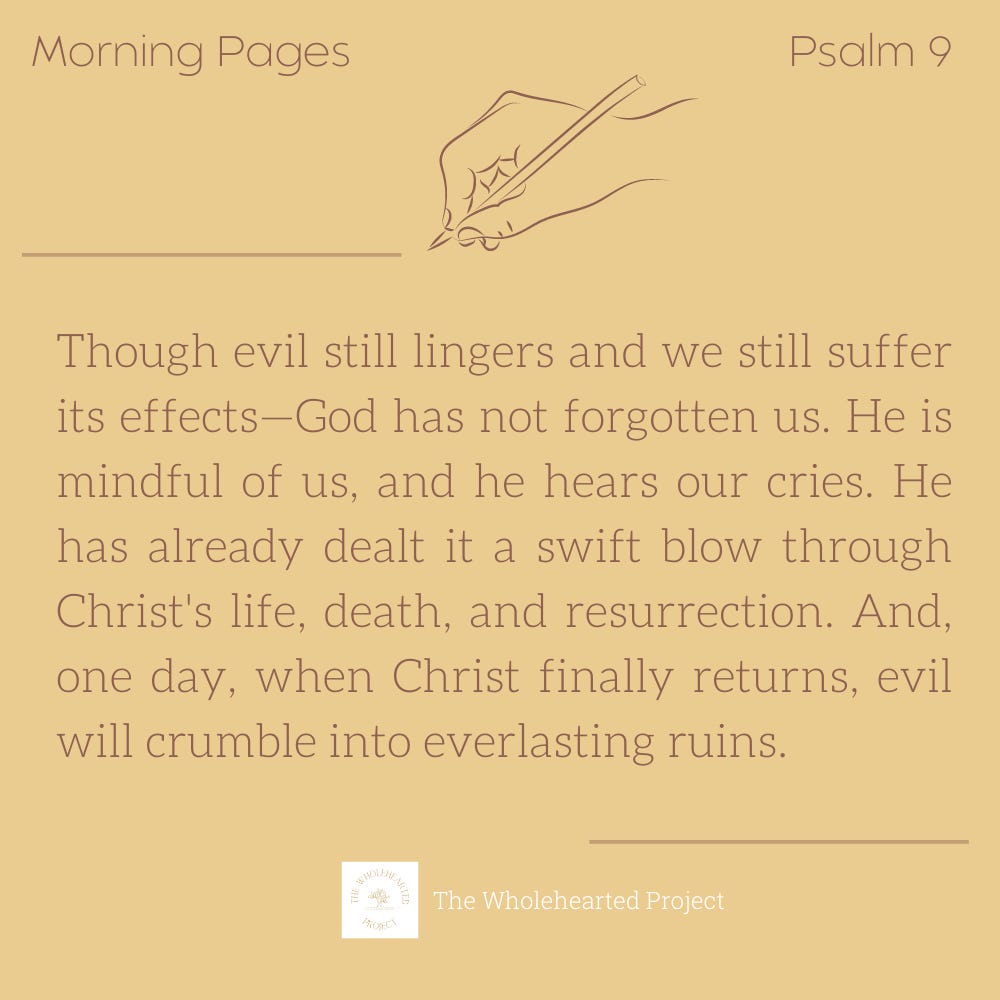Morning Pages: Psalm 9
Psalm 9 captures the broad range of the human experience—gratitude, lament, suffering, worship, and hope. In this psalm, David proves that both gratitude and lament can and do co-exist. They’re parallel tracks on the wholehearted journey with Yahweh.
Vs. 1-2 “I will give thanks to the LORD with my whole heart; I will recount all of your wonderful deeds. I will be glad and exult in you; I will sing praise to your name, O Most High.”
David begins this psalm with a series of declarations, saying,
“I will…
—Give thanks
—Recount the Lord’s deeds
—Be glad and rejoice in the Lord
—Sing praise
David is making a conscious commitment to praise Yahweh regardless of his circumstances. This reminds me that gratitude is, first and foremost, a discipline. It’s a muscle I exercise, not just a feeling I feel. And I can choose to do it amid fear, uncertainty, and suffering.
I remember exercising this muscle during a painful emotional and spiritual season many years ago. Early in my recovery from drug addiction, I'd been taught that gratitude was, in essence, kryptonite for my addiction—weakening its allure and power over me. But in this time of prolonged suffering, I found it particularly hard to be grateful. And yet, I understood its importance to my ongoing sobriety. So I uttered, “Thank you, God, that I am five minutes closer to the other side of this pain.” During this dark night of the soul, I expressed a kind of gratitude that did not diminish my pain. And it may be one of the most honest prayers of thanksgiving I’ve ever prayed.
Here, amidst whatever trial David faces, he doubles down on gratitude and begins to recount all the wonderful works of Yahweh with a powerful specificity.
Vs. 3-6 "When my enemies turn back, they stumble and perish before your presence. For you have maintained my just cause; you have sat on the throne, giving righteous judgment. You have rebuked the nations; you have made the wicked perish; you have blotted out their name forever and ever. The enemy came to an end in everlasting ruins; their cities you rooted out; the very memory of them has perished."
There is a rhythmic nature to these verses, with the resounding beat landing on each “you have” statement:
You have maintained my just cause
You have sat on the throne giving righteous judgment
You have rebuked the nations
You have made the wicked perish
You have blotted out the name of the wicked forever
You have rooted out the enemy
It’s as if, with each statement, David is intent on hammering home that, no matter his present circumstances, Yahweh has been and will continue to be faithful to him.
He continues,
Vs. 7-10 "But the Lord sits enthroned forever; he has established his throne for justice, and he judges the world with righteousness; he judges the peoples with uprightness. The Lord is a stronghold for the oppressed, a stronghold in times of trouble. And those who know your name put their trust in you, for you, O Lord, have not forsaken those who seek you."
There’s an interesting contrast that occurs between verses 5-7. David says the very memory of the wicked has perished, and their names have been blotted out forever. But, in contrast, Yahweh sits enthroned as Lord for all eternity.
There is something so encouraging about this. It's easy to be overwhelmed by the state of our world, with every news headline highlighting political corruption on all sides, moral failings of leaders, mass killings, and all manner of brokenness. And it's right here, where evil seems to be gaining ground and winning the war, that David drives Yahweh's banner into the ground. Evil may have its moment, but it will be short-lived.
In verses 7-10, the theme of God's justice comes into clear view, but it is present throughout the entirety of this psalm:
Vs. 4a: You have maintained my just cause
Vs. 4b: You have given righteous judgment
Vs. 7b: The LORD has established his throne for justice
Vs. 8a: He judges the world with righteousness
Vs. 8b: He judges the people with uprightness
Vs. 12a: He avenges
Vs. 16a: He has executed judgment
Two ideas are expressed here: God's governance (his actions) and his righteousness (his morally perfect character). With these two things in view, we learn that God always does what is right. Only he can accurately assess the state of the world and the state of our hearts and judge it rightly. This is why David sees Yahweh as a shelter for those who have experienced injustice:
Vs. 9-10 "The Lord is a stronghold for the oppressed, a stronghold in times of trouble. And those who know your name put their trust in you, for you, O Lord, have not forsaken those who seek you."
While not many of us have known oppression like slavery, the Holocaust, or true religious persecution, we all still experience the oppression of sin—the harms done by me (our own sin), harms done to me (sins others commit against us), and suffering under the brokenness of the world. And while we are no longer slaves to sin, we still suffer the ongoing effects of its presence. So here, David reminds us that our covenant-keeping Lord is a stronghold. He is our refuge and security, and he will not forsake us.
This is where we may have to choose to believe what God's word says over what our experiences seem to indicate. Because there are times when we certainly feel forsaken or, at the very least, forgotten. Times when you have no more tears to cry, no more words to say, and all your energy has waned. But God's word shows that he repeatedly fulfilled his promises to his children. He was always there, always at work. That doesn't necessarily make the between time any easier, but it does give us a refuge to run to when our hope and strength fail.
He continues,
Vs. 11-12 "Sing praises to the Lord, who sits enthroned in Zion! Tell among the peoples his deeds! For he who avenges blood is mindful of them; he does not forget the cry of the afflicted."
These may be my favorite verses. God is mindful of his children; he remembers them. To be mindful of another is to be aware of, careful with, attentive to, and thoughtful toward. Who are we that the God of the universe is mindful of us? God hears the cries of the afflicted. And though his justice may be delayed, it is not forgotten. So these verses ring out as an anthem of hope for those who groan under their afflictions.
David turns now with a plea to Yahweh,
Vs. 13-14 "Be gracious to me, O Lord! See my affliction from those who hate me, O you who lift me up from the gates of death, that I may recount all your praises, that in the gates of the daughter of Zion I may rejoice in your salvation."
Up until this moment, it would be easy to assume that David wrote this psalm in a time of flourishing. But these verses show us that he is writing while suffering at the hands of his enemies. He calls on Yahweh to be gracious so that he may tell others of the Lord's salvation. For all of David's failings, it seems he is always certain where his salvation comes from and that praise belongs to Yahweh alone.
He now returns to pondering the fate of the wicked,
Vs. 15-16 "The nations have sunk in the pit that they made; in the net that they hid, their own foot has been caught. The Lord has made himself known; he has executed judgment; the wicked are snared in the work of their own hands."
David knows the fate awaiting the wicked: They will fall into their own traps and suffer the work of their own hands. This is a theme I have seen repeated in the psalms frequently. The Lord does not allow the plans of the wicked to prosper forever. Instead, and quite ironically, he lets them be ensnared in their own evil schemes.
He continues,
Vs. 17-18 "The wicked shall return to Sheol, all the nations that forget God. For the needy shall not always be forgotten, and the hope of the poor shall not perish forever."
This is another contrast, similar to that in verses 5-7. Except this time, the wicked and the afflicted are contrasted. The fate of the wicked—those that forget God—will die and descend into the depths. But the poor and the needy will not always be forgotten, and though their hope may be faint, it will not perish. God will see to it that he preserves those who are his.
David concludes with one final plea for God to rise up and execute justice against the nations,
Vs. 19-20 "Arise, O Lord! Let not man prevail; let the nations be judged before you! Put them in fear, O Lord! Let the nations know that they are but men!"
David brings all of his life to Yahweh—gratitude and lament, confidence and need—and places it, unashamedly, at the Lord's feet. This is a picture of what it looks like to live in a wholehearted relationship with our Father. The psalms continue to permit me to live an honest life before God—to be fully alive to both joy and pain, gratitude and lament, trials and triumphs, faith and doubt. I do not have to deny my suffering as a believer. I can be honest about the wickedness and evil around me and appeal to the Lord to act on behalf of his people, and at the same time, I can still praise the Lord for how he has worked in the past and trust that he will not allow wickedness to linger forever.
Though evil still lingers and we still suffer its effects—God has not forgotten us. He is mindful of us, and he hears our cries. He has already dealt it a swift blow through Christ's life, death, and resurrection. And, one day, when Christ finally returns, evil will crumble into everlasting ruins.
Come quickly, Jesus.
Until next week,
CC





